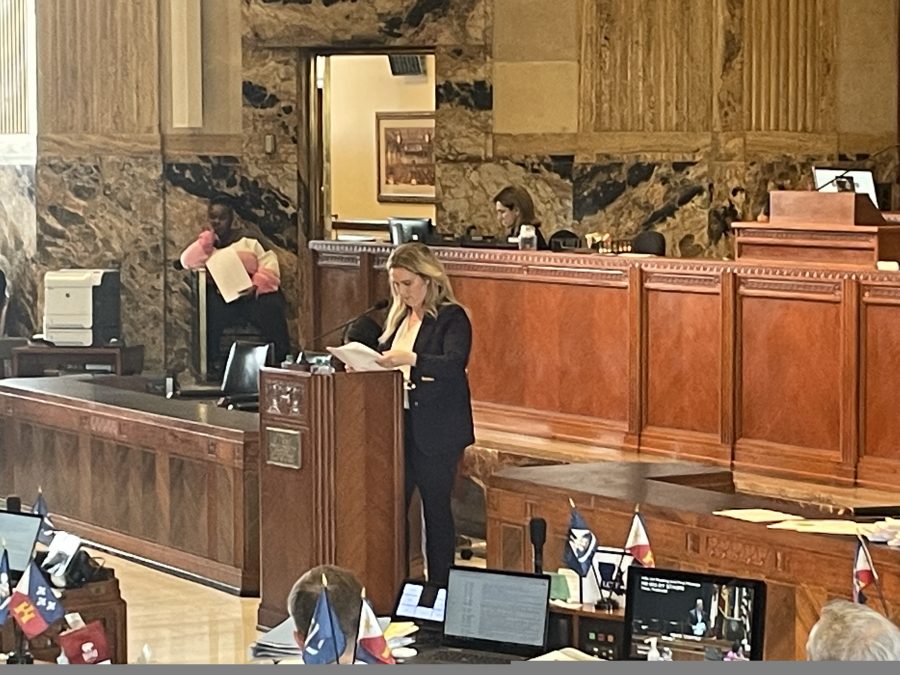
Entergy Providing $1 Million to Help Jumpstart LCTCS Implementation of MJ Foster Promise Program
June 2, 2022
Coast Guard assists 2 boaters, 2 dogs on disabled sailing vessel 52 miles offshore Vermilion Bay
June 3, 2022By Piper Hutchinson, LSU Manship School News Service
BATON ROUGE–The House gave final passage Thursday to bills that would enhance criminal penalties for abortion providers and make it a crime for out-of-state companies to supply abortion pills to Louisiana residents by mail.
Senate Bill 342, sponsored by Sen. Katrina Jackson, D-Monroe, would increase criminal penalties for abortion providers under Louisiana’s trigger laws.
The bill passed 72-25, with Democratic Reps. Robby Carter of Amite, Chad Brown of Plaquemine, Mack Cormier of Belle Chasse, Travis Johnson of Vidalia, Jeremy LaCombe of Livonia and Francis Thompson of Delhi supporting the bill.
Rep. Mary DuBuisson of Slidell was the only Republican to vote against the bill.
The House also voted 72-24 vote to give final passage to Senate Bill 388, which would criminalize providing abortion-inducing medication by mail.
Louisiana is one of thirteen states with trigger laws that go into effect if the U.S. Supreme Court overturns Roe v. Wade. Under a law signed by former Gov. Kathleen Blanco, a Democrat, most abortions would become illegal almost immediately upon the overturning of Roe.
Existing statute allows for prison terms of one to five years and fines of $5,000 to $50,000 for abortion providers. Jackson’s bill increases the penalties to one to 10 years of prison time and fines of $10,000 to $100,000.
Gov. John Bel Edwards, a Democrat, said at a press conference Thursday that he supports exceptions for rape and incest. He has not yet said whether he would veto Jackson’s bill. He has previously supported bills that do not include the exceptions.
The bill was amended significantly on the House floor. Rep. Julie Emerson, R-Carencro, who carried the bill on the floor, sponsored 15 pages of amendments to the five-page bill.
Included in the amendments that passed were exceptions to the criminal penalties for abortion providers in circumstances involving the life or health of the mother or if the fetus had a condition that is not compatible with life.
Several amendments to the bill were killed on the floor.
Rep. Mandie Landry, D-New Orleans, proposed an amendment that would make it explicit that the criminal penalties could not be applied to women who end their own pregnancies. Landry’s amendment was shot down.
Emerson argued that the bill’s language would already prevent that from happening.
While Jackson’s bill would not criminalize those who undergo abortions, abortion rights advocates point out that women who end their pregnancies could potentially be penalized under other existing abortion statutes.
Louisiana’s criminal code defines “person” as “a human being from the moment of fertilization and implantation.”
This definition could potentially allow for prosecution of anybody who ends a pregnancy, not just abortion providers.
Landry introduced a bill to prevent such prosecutions, but the bill was rejected in April by the House Committee on Administration of Criminal Justice.
Other amendments killed include another by Landry that would have expanded the exception for the life and health of the mother to include mental health conditions; one by Rep. Cedric Glover, D-Shreveport, that would have created an exemption for rape and incest; and one from Rep. Aimee Freeman, D-New Orleans, that would have allowed for just one doctor, rather than two, to certify that the fetus had a condition that is not compatible with life.
In opposing the amendments that would exclude rape or incest, Emerson read comments from Rep. Patricia Moore of Monroe, who has been out on leave for much of the session.
Moore, a pro-life Democrat, shared her mother’s experience as a teenager pregnant from a rape in the 1950s.
Glover argued that women should have a choice, pointing out that safe and legal abortions were not an option for a poor teenager in the 1950s, two decades before Roe v. Wade.
Landry took to the floor to oppose the bill, speaking on her Catholic faith.
“This has made political pawns of women’s bodies,” Landry said.
“I’m as Catholic as all of you,” Landry said. “You don’t have to follow all the dogma of our respective religions.”
The House also gave final passage to the bill that would criminalize abortion aids from mail providers.
Senate Bill 388, sponsored by Sen. Sharon Hewitt, R-Slidell, prohibits the sale of abortion-inducing medication by prescribers outside of the state.
The bill passed on a 72-24 vote, with Democratic Reps. Robby Carter of Amite, Chad Brown of Plaquemine, Mack Cormier of Belle Chasse, Travis Johnson of Vidalia, Jeremy LaCombe of Livonia and Francis Thompson of Delhi joining House Republicans in supporting the bill.
The bill was carried on the floor by Rep. Laurie Schlegel, R-Jefferson.
The bill expands the definition of criminal abortion to include delivering, dispensing, distributing, or providing abortifacients when the person administering the medication is not a doctor licensed in Louisiana, effectively banning abortion by mail.
The law provides for five to 10 years of prison time or a $10,000 to $75,000 fine, or both. If the pregnant person is a minor, the penalty for the medication provider could range from 15 to 50 years of imprisonment or a $15,000 to $100,00 fine, or both.
Opponents of the bill argued that it is unconstitutional, as it potentially violates the federal Commerce Clause.
Freeman sponsored an amendment to the bill that also would prohibit the sale of erectile dysfunction drugs by mail.
“If we are going to legislate what women are trying to order through the mail, we should also legislate what men are trying to get through the mail,” Freeman argued.
House Speaker Clay Schexnayder, R-Gonzales, ruled that the amendment was not germane to the bill.
Because both bills were amended on the House side, they go back to the Senate for concurrence, which must be done by the end of the legislative session on Monday.













